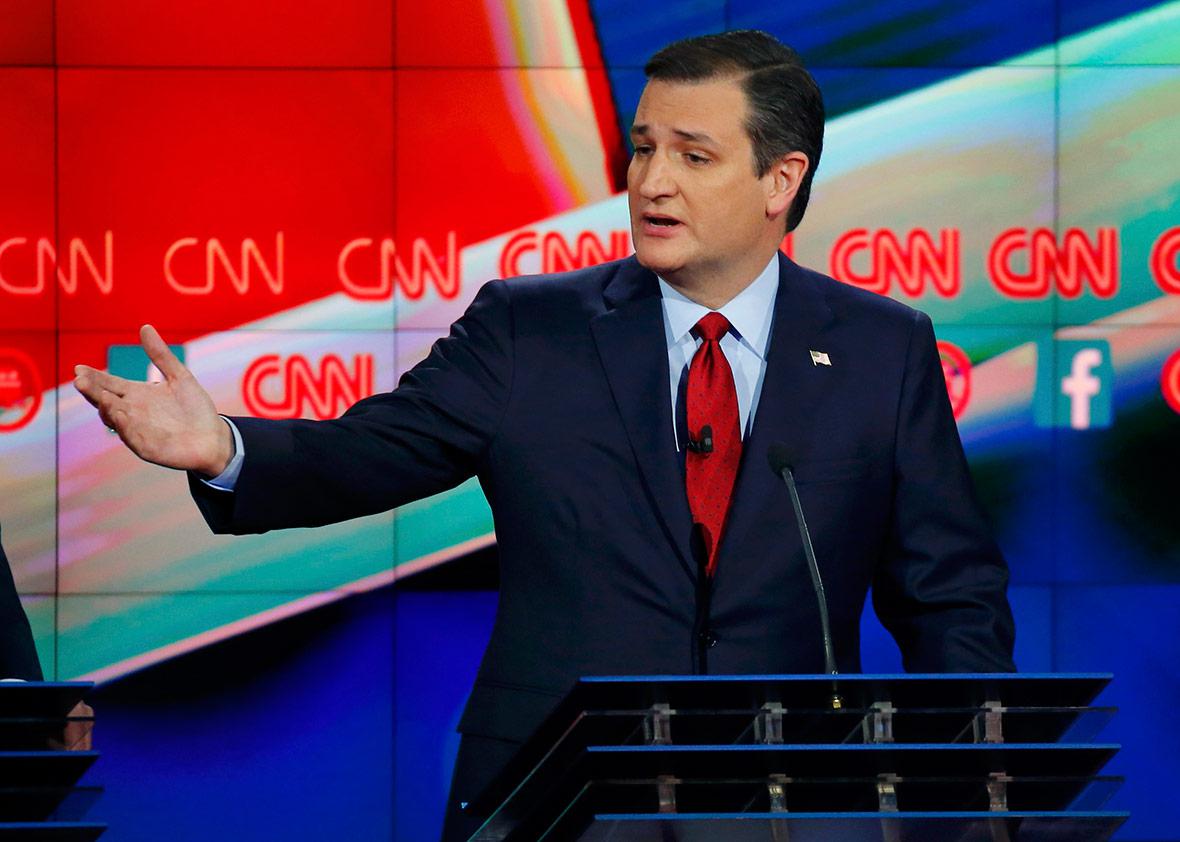In my preview post for Tuesday night’s debate, I noted that when it comes to fighting ISIS, the primary point of disagreement between the GOP candidates is less about the group itself than about the tricky question of what to do about Syrian President Bashar al-Assad. But I was still surprised by the degree to which the topic of regime change dominated the discussion.
There was a stark divide on display between the more mainstream Republican candidates and the “outsiders.” Marco Rubio, Chris Christie, Carly Fiorina, John Kasich, and Jeb Bush—despite unwelcome comparisons to his brother—all support the removal of Assad, whom they call an Iranian puppet who facilitated the rise of ISIS. Donald Trump, Ted Cruz, and Rand Paul say getting rid of Assad would, like the removal of Saddam Hussein and Muammar Qaddafi, lead to chaos in the Middle East. Ben Carson’s position—there was something involving oxygen masks—is a little hard to parse.
Cruz gave about as forceful a defense of supporting dictators as you’re likely to hear from an American candidate for president:
Let’s go back to the beginning of the Obama administration when Hillary Clinton and President Obama led NATO in toppling the government in Libya. A number of Republicans supported them, the result of that—and we were told then there were these moderate rebels that would take over. The result is that Libya is now a terrorist war zone run by jihadists. Move to Egypt. Once again the Obama administration toppled Mubarak who had been a reliable ally of the United States and Israel and in its place Morsi and the Muslim brotherhood came in, a terrorist organization. And we need to learn from history, these same leaders, Obama, Clinton and far too many Republicans want to topple Assad. Assad is a bad man. Qaddafi is a bad man. But they were assisting us, at least Qaddafi and Mubarak, in fighting terrorists.
And if we topple Assad, ISIS will take over Syria and it will worsen national security interests. Instead of [promoting democracy] we ought to hunt down the enemies and kill ISIS rather than creating opportunities for ISIS to control new countries.
He also compared the idea of moderate rebels in Syria with a “purple unicorn.” I expect his argument will be persuasive for many voters, who want action against ISIS but don’t want to see another Iraq or Benghazi, though as Fiorina pointed out, Cruz’s regime-change-leads-to-chaos formulation sounds an awful lot like Obama’s.
Rubio provided the strongest counter-argument:
Assad is one of the reasons why ISIS exists to begin with. He has been so brutal towards the Sunni within Syria that he created the space that led to the people of Syria themselves to stand up and overthrow him. That led to the chaos [that allowed ISIS] to grow more powerful.
While I’m skeptical of Rubio’s argument that arming anti-Assad rebels early in the rebellion could have prevented the civil war, this is a good explanation of why it’s not as simple as just letting the Syrian government fight ISIS.
Rubio also provided a strong defense of his decision to support military action against Qaddafi:
The revolt against Qaddafi was started by the Libyan people. And I argued we needed to get involved because he was going to go one way or the other, and the longer the civilian war took, the more militias would be formed. As far as Muammar Qaddafi, he is the man who killed the Americans over Lockerbie, Scotland, and killed Marines. And you know why he cooperated on the nuclear program? Because we got rid of Saddam Hussein.
We will have to work with less than ideal governments. The government in Saudi Arabia is not a democracy, but we have to work with them. The government in Jordan is not perfect but we have to work with them. But Assad, who sent IEDs into Iraq, if he goes, I will not shed a tear.
It’s still striking to hear a candidate defend regime change in the name of U.S. national security in the post-Iraq era. This is also the type of forceful defense of the Libya intervention that Hillary Clinton—whose policies on both Libya and Syria have been a lot closer to Rubio’s than either would like to admit—has been ineffectively searching for in her debates.
